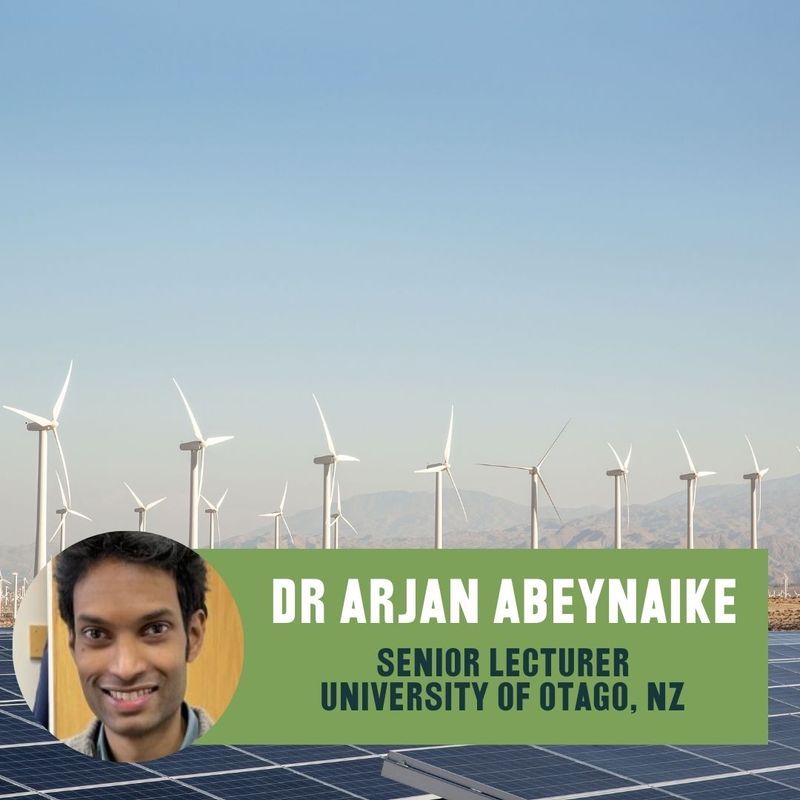
Dr Arjan Abeynaike, a senior lecturer at the University of Otago in New Zealand, recently shared his insights into the evolving landscape of renewable energy in education and how academia is adapting to industry demands. With a rich academic background, including a PhD in Chemical Engineering from Cambridge and experience working in multiple global renewable institutions, Dr Abeynaike brings a comprehensive perspective to the table.
The Shift in Academic Focus Towards Renewable Energy
Dr Abeynaike highlights that there’s been a noticeable shift in academic focus over the years. Initially, energy programs, like the one at the University of Otago, emphasised energy efficiency. However, the current emphasis is directly on renewable energy and decarbonisation, reflecting shifts in both the industry and society. This shift is something we’re seeing all over the globe, with more universities than ever offering courses in renewable energy and students being encouraged to pursue a greener career plan.
Student Interest vs. Industry Demand
Contrary to initial expectations, Dr Abeynaike notes that there hasn't been a significant increase in student enrolment in these programs, despite a growing societal interest in sustainability. But perhaps this gap is down to a simple lack of awareness about the existence of specialised courses in renewable energy. And if so, increasing awareness and promoting these programs to high school age students is a crucial step when it comes to aligning student interest with industry needs. That’s where the need for an introductory, or pre-university course could be beneficial for those considering a future in renewables.
Career Advice for Students in Renewable Energy
Having been a lecturer since 2018, Dr Abeynaike advises students aspiring to enter the renewable sector to be proactive and open-minded. The renewable industry, while growing, is still relatively small compared to established sectors such as oil and gas. Opportunities in renewables might not be as available, meaning a more active approach to seeking them out is required. And Dr Abeynaike further suggests considering roles in non-renewable companies that are transitioning towards sustainable practices, as this can also provide valuable experience.
Interdisciplinary Approach to Renewable Education
The lecturer underscores the importance of interdisciplinary education in addressing the challenges of renewable energy and decarbonisation. While specialist energy graduates are crucial, skills from various engineering and science disciplines are also vital. This broad-based approach is essential in building a workforce that’s capable of meeting ambitious global renewable energy targets.
University-Industry Collaboration
On the topic of university-industry collaboration, Dr Abeynaike feels more could be done to strengthen these ties. Internship and pre-grad opportunities, as well as aligning course content with industry needs are areas for improvement. He cites the example of Otago University’s "Living Labs” - an initiative where students are given the opportunity to work on real-world projects over the summer under academic supervision. This provides them with actual, relevant experience and helps to encourage renewable institutions to take on graduates. They’re seeing huge success in their “Living Labs” model and the hope is that it will progress as an example of an effective partnership.
The Road Ahead for Renewable Energy Education
Reflecting on the ambitious global targets for renewable energy (like those set at COP28) Dr Abeynaike acknowledges the challenges ahead. The time frame is tight, and the recruitment industry will have to be innovative in meeting talent demands. Graduates from a range of disciplines will be needed to address the challenges of decarbonisation and renewable energy growth.
Dr Abeynaike's insights offer a comprehensive view of the current state and prospects of renewable energy education. As the demand for sustainable energy solutions grows, the role of academia in shaping the next generation of professionals becomes increasingly significant. The University of Otago's approach of blending academic rigour with real-world applications serves as a beacon for others to follow in this crucial global endeavour.
If you’ve found this article useful and would like to hear more of what Dr Arjan Abeynaike has to say on the effects of COP28’s commitments on academia, take a deeper dive with our latest report, Powering the Energy Transition.

Topics covered
Keep reading...
All blogs-
SOapbox Season Two
The SOapbox Series | Season 2 Episode 3: All things sustainability
-
Life at SO
Spencer Ogden appoints new global Executive Directors
-
Latest sector news
Renewable energy overtakes gas to power Britain
-
Diversity and Inclusion
International Women's Day 2022 : An interview with Catherine Phillips, Chief Financial Officer at...
-
SO Careers
SO Careers - Meet Senior Manager - Head of Permanent Business, Scarlet Lee





